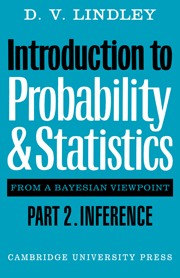5 - Inferences for normal distributions
Published online by Cambridge University Press: 26 March 2010
Summary
In this chapter we begin the discussion of the topic that will occupy the rest of the book: the problem of inference, or how degrees of belief are altered by data. We start with the situation where the random variables that form the data have normal distributions. The reader may like to re-read § 1.6, excluding the part that deals with the justification of the axioms, before starting the present chapter.
Bayes's theorem and the normal distribution
A random sample of size n from a distribution is defined as a set of n independent random variables each of which has this distribution (cf. §§ 1.3, 3.3). If for each real number, θ, belonging to a set (say, the set of positive numbers or the set of all real numbers), f(x|θ) is the density of a random variable, then θ is called a parameter of the family of distributions defined by the densities {f(x|θ} (cf. the parameter, p, of the binomial distribution, §2.1). We consider taking a random sample from a distribution with density f(x|θ) where θ is fixed but unknown and the function f is known. Let H denote our state of knowledge before the sample is taken. Then θ will have a distribution dependent on H; this will be a distribution of probability in the sense of degree of belief, and we denote its density by π(θ|H). As far as possible π will be used for a density of beliefs, p will be used for a density in the frequency sense, the sense that has been used in applications in chapters 2–4.
- Type
- Chapter
- Information
- Publisher: Cambridge University PressPrint publication year: 1965
- 3
- Cited by



